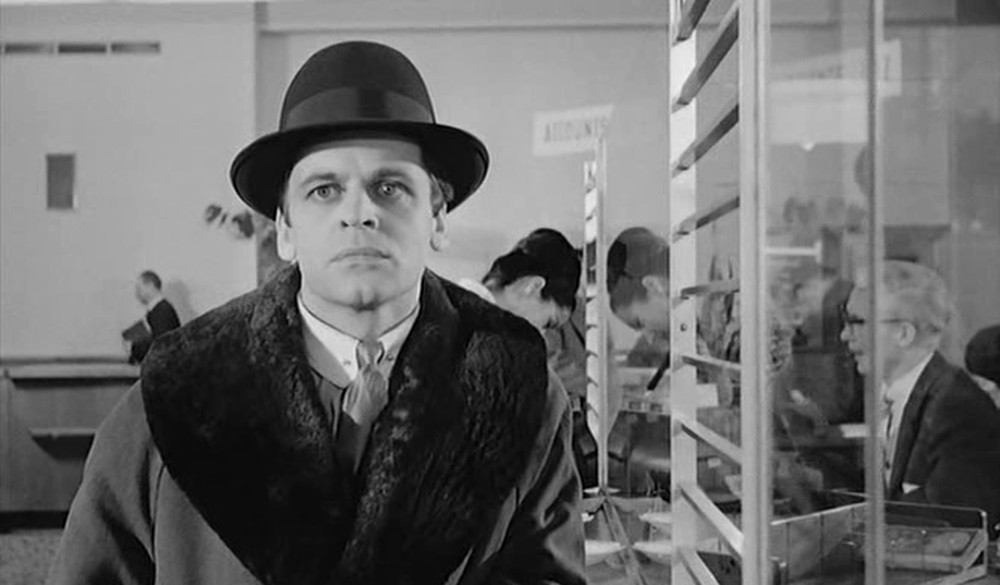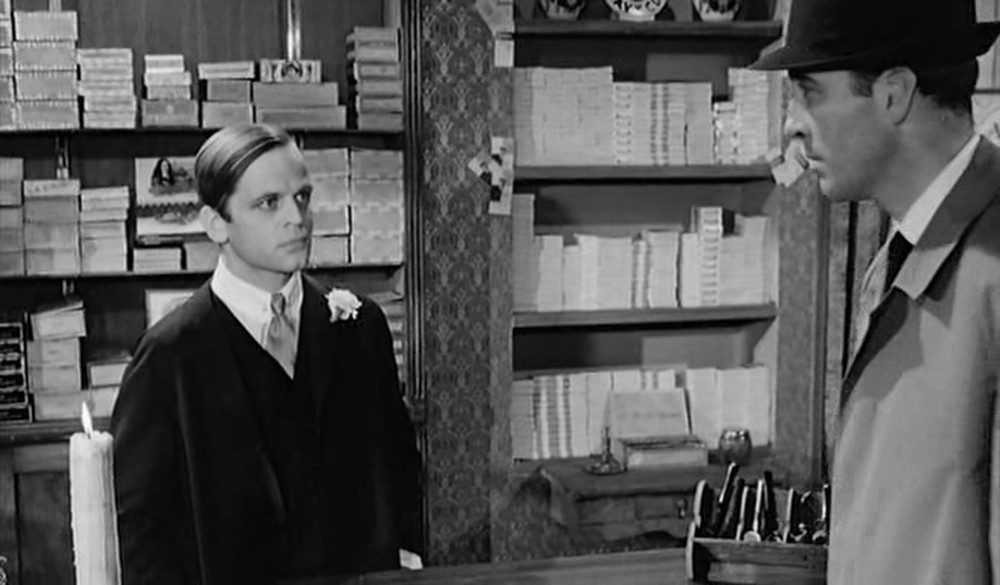Dir: Helmut Ashley
Star: Adrian Hoven, Christopher Lee, Marisa Mell, Klaus Kinski
a..k.a. The Puzzle of the Red Orchid
Klaus Kinski was famous enough at this point to receive a “with…” listing and his own page at the end of the credits, along with Eddi Arent. He plays a Chicago gangster in this, listed in the credits as “der schöne Steve”, though the subtitles translate this as “Gunner Steve” for some reason, rather than “Beautiful Steve”. I’m fine with the subs: his character here is certainly not what I’d call attractive, even by the standards of Klaus in this area. But I’ll just avoid any issues, and refer to him as Steve, for the rest of this article.
It opens with Steve showing up late to a poker party, held by members of his gang, including their leader, O’Connor. This tardiness proves to be Steve’s savior, as his associates are gunned down by members of a rival gang, under the oddly-named Kerkie Minelli. Steve hightails it out of Chicago for safer pastures in the United Kingdom. But Minelli ends up there as well, after being kicked out of America by the authorities for what I believe they call “moral turpitude”, though the cops can’t prove any specific crime he committed.

A year later, in London, someone starts extorting money from the rich, sending them messages, cut out of newspapers, and threatening them with death if they don’t pay up. Worse, the perpetrators follow through on the threats to those who won’t pay, or who try and alert the police. This is uncharted territory for Scotland Yard, who are used to more genteel methods of blackmail. Investigating detective, Inspector Weston (Hoven), therefore gets permission from his boss to bring in FBI specialist Captain Allerman (Lee) to help with the case. He immediately identifies the cut-out messages as a hallmark of the O’Connor gang, and with Steve’s presence in the city known, he immediately becomes the top suspect.
Next to receive a message is an elderly millionaire Elias Zacharias Tanner. Weston is familiar with the man – though more familiar with his secretary and live-in help, Lillian Ranger (Mell), Tanner has just changed his will to leave all his assets to Lillian, rather than ne’er-do-well nephew and nomadic orchid hunter, Edwin. After Tanner is gunned down in his own home, by a pair of assassins who pretend to be Scotland Yard bodyguards, Edwin shows up for the reading of the will, and is rather miffed to discover he is no longer present in it.
Matters are complicated by a copy-cat set of blackmailer, who opt for a less intensive approach, using pre-printed forms, into which only the victim’s name and amount have to be added. Allerman identifies this approach as belonging to the Minelli mob, and Lillian is the recipient of one of their notes. She can’t pay, as it seems Tanner had a lot of unpaid debts which drained the estate’s funds. But Edwin gets in her good graces by engaging in some threatening behavior of his own, against Minelli’s wife, which gets the mobster to cross Lillian off his list of candidates.

So, Weston now has two blackmail gangs to worry about, run by Steve and Minelli – and the pair have no intention of letting the other muscle in on their turf. Despite an apparent gentleman’s agreement to split the territory, using Regent Street as the boundary, unpleasantness between them escalates, with Minelli planting a bomb in the tobacconist’s shop run by Steve as a cover. Indeed, these problems end up cancelling each other out (with a little help from the “dead” O’Connor), happily for the authorities. But there’s still the issue of Lillian and Edwin to be settled, for it turns out that Edwin may not be the happy horticulturist he initially appeared.
As a thriller, it works reasonably well, though as always with these Edgar Wallace krimis, a certain amount of suspension of disbelief is required by the viewer. Less here than some, with a relatively grounded plot, even if there are still a number of the usual tropes, such as people not being who they appear to be. Outside of Kinski, probably the most memorable character is Arent’s, operating as his usual comic relief. Here, he plays butler Parker, employed by all the blackmail victims (yet somehow escaping police suspicion!), and due to their deaths, has to keep seeking new employment. Eventually calling himself “Der Todesbutler” – the Butler of Death! – he even gets recommended by Steve to ask Minelli for a job.

Kinski’s character initially appears to be small and mousy. Yet Steve proves capable of holding his own against a “big fish” like Minelli, even refusing an offer of 75,000 pounds – a fortune in the early sixties – to leave town. There’s a particularly good scene (above) in which Allerman visits Steve’s shop with a search warrant – apparently more to let him know the police are onto him, than in the hope of actually finding incriminating evidence:
Allerman: I suppose you know what I’m after.
Steve: But, Allerman. It doesn’t change. It’s the same 2 things. Probably a scissors you think I used simply to cut letters out of a newspaper.
Allerman: I see I’ll find nothing. One fine day, I know I’ll find them both.
This may be the first time Kinski and Lee shared a scene. They were both in Das Geheimnis der gelben Narzissen the previous year, but I don’t recall them ever being on screen together. It’s particularly neat to watch Christopher Lee speaking fluent German again [the English dub uses neither Lee’s nor Kinski’s voice]. As the still above suggests, he quite towers over Klaus, though it’s clear that Steve is not intimidated by his interrogation. And neither is his parakeet, which yells out “Dirty copper! Dirty copper!” on Allerman’s entrance!
I’d like to have seen more of Klaus as this criminal mastermind . There are a number of neat little touches, such as the sword-stick he carries, with which he can dispatch enemies. Still, I was satisfied overall, and I’d call this a better than average Wallace krimi, which kept my attention and kept me guessing until the very end.

A great film and wonderful performance by Christopher lee, i love all his films and been a devoted dedicated fan of him since 1958, i miss him very much.